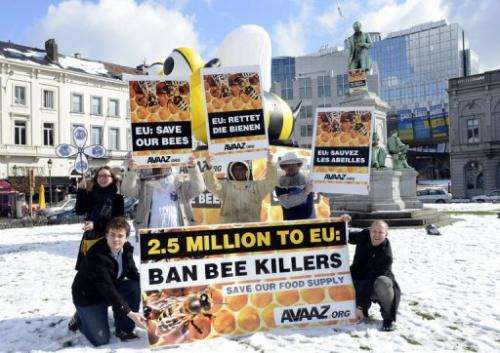Bee keepers demonstrate to demand that lawmakers ban the use of bee-killing pesticides in front of the European Parliament in Brussels, on March 14, 2013. The EU appears set to impose a two-year ban on the use of insecticides blamed for a sharp and worrying decline in bee populations, an EU source said Thursday.
The EU appears set to impose a two-year ban on the use of insecticides blamed for a sharp and worrying decline in bee populations, an EU source said Thursday.
A committee of experts is due to vote Monday on the ban in an effort to protect bees and other insects which play an indispensible role in food production through plant pollination.
A vote earlier this year failed to produce a large enough qualified majority in favour, forcing the European Commission to try a second time.
Under EU procedure, if Monday's vote is the same, the Commission has the authority to proceed on its own with the ban.
"The most likely outcome will be the same as last time ... and in that case, the Commission will decide to put the ban into operation," the source said.
The Commission wants the insecticides banned for use on four major crops—maize (corn), rape seed, sunflowers and cotton—in a bid to protect the bee population.
"The nightmare scenario that there would be a qualified majority against the ban is virtually impossible," the source added.
Experts have isolated three compounds causing concern—clothianidin, imidacloprid and thiamethoxam, known as neonicotinoids—which are present in insecticides produced by pharmaceutical giants Bayer of Germany and Switzerland's Syngenta.
The European Food Safety Authority (EFSA) said earlier this year that the insecticides posed "disturbing" risks to bees and other pollinating insects vital for human food production.
Swiss-based agrichemical giant Syngenta has urged Brussels to withdraw the plan, saying the EFSA report was "fundamentally flawed."
(c) 2013 AFP























